Good Practice Guide: Complaint handling in a crisis
Date posted:Foreword
In the midst of every crisis lies great opportunity.
Never let a good crisis go to waste.
Great thinkers and leaders often observe that from crisis comes opportunity; and while the COVID-19 pandemic undoubtedly presented many challenges, it also opened many possibilities for improvement in services to the community.
The Victorian Government rapidly developed many initiatives in response to the pandemic. This Guide draws on experiences across four very different programs, with a focus on how the agencies handled complaints. The people involved had to learn fast, move resources, and often do things that had never been done before, or at the pace required. Sometimes stumbling and often bruised, they made it across the line.
The four programs included in this Guide – financial support for small business, grants to boost residential construction, quarantine services, and quick rent dispute resolution – represent only a small sample of the pandemic- driven initiatives introduced by the Government. But taken together they present a useful snapshot of how agencies can prepare for, and respond to, the next crisis.
This Guide is deliberately brief. It sets out 12 key lessons for handling complaints in emergency response and relief programs, drawn from the collective wisdom of the agency officers we spoke with and of our office.
Each agency received complaints directly, as did my office about them. The best programs put complaint handling front and centre, and evolved as they went. We engaged with staff from all four programs, and I thank them for their openness and willingness both to learn and to share, before their hard-won knowledge was scattered to the winds.
This Guide also draws on the learnings from our own complaint handling and investigations into decision making during the COVID-19 crisis. The July 2020 lockdown of some public housing towers, the Business Support Fund, and the permit scheme during State border closures were each the subject of separate Ombudsman reports. Each report can be usefully mined for the further lessons revealed, and many of the themes identified intersect with this Guide.
This, then, is the opportunity: for others to get a faster start when faced with the next crisis. Because crisis is a certainty, whenever or however it next evolves. And the more we can learn from the last one, the better we will handle it. My advice to all public organisations – keep this Guide close by.
Deborah Glass
Ombudsman
How this Guide can help
This Guide is intended to help agencies involved in emergency response and relief work to deal with complaints about their programs.
In emergency situations, complaints about service delivery are inevitable. Agencies must set up programs quickly. The people using these programs are stressed or in turmoil. Public scrutiny is intense. Staff may be personally caught up in the emergency, and agencies may need to divert resources away from their core business and services. When things go wrong, concerns need to be resolved fast.
The Victorian Ombudsman publishes various good practice guides on handling complaints. They set out the fundamentals, such as having clear processes, good communication and a willingness to learn and change if things go wrong. These basics remain important in a crisis.
As the COVID-19 pandemic unfolded, many Victorian agencies managed complaints well. Others struggled to deal with high volumes of complaints on top of other pressures.
With many pandemic initiatives winding up and staff moving on, we spoke with agency staff involved in four programs about how they managed complaints.
We asked them:
- what worked well
- what they would do differently next time
- their advice for agencies grappling with future emergencies.
This Guide is not based on a formal investigation. It makes no judgement on the performance of the four programs.
The 12 lessons outlined in the Guide apply across many settings, whether a large government department, a local council or a small community group. Depending on the resources and experience available to you, some elements might be more relevant than others.
We encourage all Victorian public agencies to build these lessons and good complaint handling practices into their future emergency planning.
Complaints are a valuable source of insight into the design of our grant programs, and the quality of the services we deliver
Business Costs Assistance Program team
Overview of the four programs
Grants for business owners
The former Department of Jobs, Precincts and Regions (‘DJPR’)* provided a range of financial supports to Victorian businesses and individuals affected by the COVID-19 pandemic lockdowns.
For this Guide, we spoke to members of the DJPR team running the Business Costs Assistance Program (‘BCAP’).
The State Government announced the program in February 2021, initially as a one-off payment to support traders
affected by a snap statewide lockdown over the Valentine’s Day weekend.Extra BCAP grant rounds and top- up payments were announced in the following months to offset the impact of COVID-19 restrictions.
In all, the program received nearly 210,000 applications and made more than one million payments totalling almost $5 billion.
Almost 14,000 of the BCAP applicants (about six per cent) lodged follow-up enquiries, review requests or complaints with DJPR. While many were simple issues with clear-cut responses, others required further consideration or investigation, putting further strain on an already stretched team.
The Ombudsman also received more than 500 complaints from business owners about BCAP, often about a lack of progress updates or querying the reasons given for rejections.
In the early days of the program, responsibility for BCAP was split across various arms of DJPR. By September 2021, DJPR had made changes to better align policy development, program delivery, and complaint handling, and had scaled up its staff.
One key takeaway for DJPR was the importance of continuous learning and evolving towards best practice in complaint handling.
As well as speaking with the BCAP team for this Guide, we have incorporated lessons brought to light by our investigation into another DJPR-administered pandemic grant, the Business Support Fund. That fund launched in March 2020 in the very early days of pandemic shutdowns and restrictions. Our investigation found some complaint handling fundamentals were not in place when the Business Support Fund was established and scaled at speed, and key checks and balances were missing.
The experiences of staff and complainants across the BCAP and Business Support Fund schemes offer useful insights for all agencies into the importance of good complaint handling when administering grant programs.
* Please note under machinery of government changes, on 1 January 2023 DJPR became the Department of Jobs, Skills, Industry and Regions.
A brand new agency for quarantine services
COVID-19 Quarantine Victoria (‘CQV’) took over responsibility for Victoria’s quarantine program in December 2020. The dedicated agency was formed to run emergency quarantine and isolation services after an earlier hotel-based scheme was scaled back due to infection control breaches.
CQV provided short-term accommodation for returning overseas travellers including maritime and air crew members, as well as community members and frontline workers unable to safely isolate in their homes. From February 2022, the program shifted to the purpose-built Victorian Quarantine Hub with cabin- style accommodation in Melbourne’s northern suburbs.
More than 72,000 people had used CQV’s services by June 2022. CQV told us that in this time it considered and closed 914 complaints. Many early complaints showed that people felt the hotel rooms used before the new dedicated hub opened were too small and lacked fresh air and natural light.
People also raised concerns about the quality and quantity of food, especially whether it met specific dietary needs and preferences. The 150 or so complaints to the Ombudsman about CQV echoed these concerns, with most being about food, accommodation conditions and fees.
CQV staff told us as a newly formed agency they aimed from the outset to focus on resident experience and to set a culture of being open and responsive to feedback. Setting up a framework for handling user complaints was one of the first tasks it undertook. It worked with partner organisations, including hotels and health services, to develop processes.
Note taking and record keeping were crucial to efficiently managing complaints. The CQV complaint team analysed data and trends daily. Site leaders and partner organisations hosted frequent and regular meetings, with complaints listed as a standing agenda item to help rapidly identify systemic problems and improvement opportunities.
CQV continually adjusted its processes as the situation evolved. The shift to the dedicated quarantine hub, for example, allowed staff to interact with residents more easily. This in turn enabled more informal and instant feedback collection than in the hotel settings. This helped CQV identify and resolve issues more quickly.
CQV’s input to this Guide is particularly useful for ideas on quickly setting up a complete complaint handling system as a newly formed agency.
Joint delivery of HomeBuilder grants
The $2 billion HomeBuilder grant program was an Australian Government initiative aimed at boosting the residential construction sector during the pandemic. Eligible homeowners could apply for a grant of $15,000 or $25,000 (depending on the application date) to put towards the cost of renovating or building.
The hybrid program was funded by the Australian Government and administered by State and Territory Governments. The State Revenue Office (‘SRO’) worked with interstate agencies to develop an online application portal. It received and processed almost 40,000 applications from local homeowners – a far higher number than in other states.
The program attracted an estimated 300 complaints to SRO, and more than 150 to the Ombudsman. Most of these complaints were sparked when the Australian Government relaxed some eligibility rules three days after the application cut-off date in April 2021.
Many homeowners felt it was unfair they were likely now eligible for the grant under the altered rules, yet could no longer apply.
The decision to change the eligibility criteria, but not allow new applications, was outside SRO’s control and put SRO in a difficult position as it attempted to deal with public enquiries and manage expectations. Communication was key, as SRO dealt with the deluge of queries.
Because the program was delivered under a National Partnership Agreement, SRO had to liaise with partner agencies to negotiate how to handle the complaints and ensure a nationally consistent approach.
It triaged complaints into two categories: individuals who had started but not submitted an application before the closing date; and those who had not accessed the online portal.
SRO said this triage process was well suited to handling the high volume of very similar complaints. Staff drafted two template letters to complainants. People who had accessed the online portal were informed they could continue with their application. Those who had not were told SRO did not have the discretion to reopen the online portal for new applications.
SRO said it recognised some people were aggrieved but because SRO was not responsible for the program’s policy settings or eligibility criteria, it felt its hands were tied.
SRO’s input to this Guide is particularly valuable for agencies managing a hybrid grant program operating across national and state jurisdictions, and provides lessons in how to manage complaints arising from a decision made by a program partner.
Fast dispute resolution for tenants and landlords
The Residential Tenancies Dispute Resolution Scheme (‘RTDRS’) was established to support landlords and tenants affected by the COVID-19 pandemic. Introduced as part of a package of temporary tenant protections, the fast-track scheme aimed to help tenants and landlords quickly reach agreement on rent reductions.
Consumer Affairs Victoria (‘CAV’) and the Dispute Settlement Centre of Victoria (‘DSCV’) administered the free service. CAV provided initial information, advice and dispute resolution services. In unresolved cases, DSCV provided conciliation services.
Between May 2020 and March 2021, the scheme dealt with more than 31,000 disputes. More than 20,000 of these were resolved by frontline CAV staff, with more than 5,800 others closed by DSCV. On average, it helped tenants negotiate rent reductions of 23 per cent.
CAV and DSCV planned how to manage any complaints, though in the end they received very few. Staff told us they believed close engagement with various stakeholder groups helped them promptly manage any issues that arose, which likely limited the number of complaints about the scheme.
The introduction of RTDRS increased the workload for staff at CAV and DSCV. From July to September 2020, CAV saw an increase of 360 per cent in approaches about residential tenancy matters. Nearly 20 per cent of these contacts related to RTDRS. Both CAV and DSCV scaled back some of their usual services so staff could work on the scheme. DSCV kept three staff in its ‘business as usual team’ and the rest were diverted.
Complaints about the scheme were managed under CAV and DSCV’s established processes. The RTDRS team proactively alerted the Ombudsman’s office we might receive complaints about this limiting of its other services, but we received only a handful.
CAV and DSCV provided insight into what they got right when working together and advice for other agencies who may need to suspend their usual services to provide emergency relief in the future.
Lesson 1. Expect Complaints
If you are running an emergency response and relief service, expect to receive complaints. When setting up programs quickly for people in distress, some things will inevitably go wrong and need fixing.
Do not wait for problems to emerge before establishing a complaint handling system. Long response times will fuel further frustration and draw more complaints. The more complaints you get, the more time and resources you will need to devote to them, at a time when your agency is already under pressure.
The agencies that managed complaints best in the COVID-19 pandemic planned for them from the start. They decided early on how they would triage complaints and had clear internal pathways to progress and resolve them. They also had ways to record and track complaints, analyse trends and monitor performance.
Partnering with other agencies or external providers to deliver your program will add complexity. Where possible involve them as you develop your operating model and complaint handling system to ensure everyone involved in the program is empowered to carry out their responsibilities.
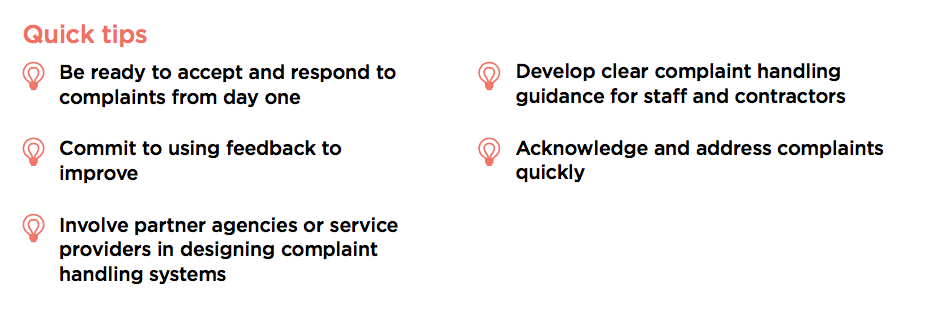
There will be people not used to government and not used to process.
BCAP team
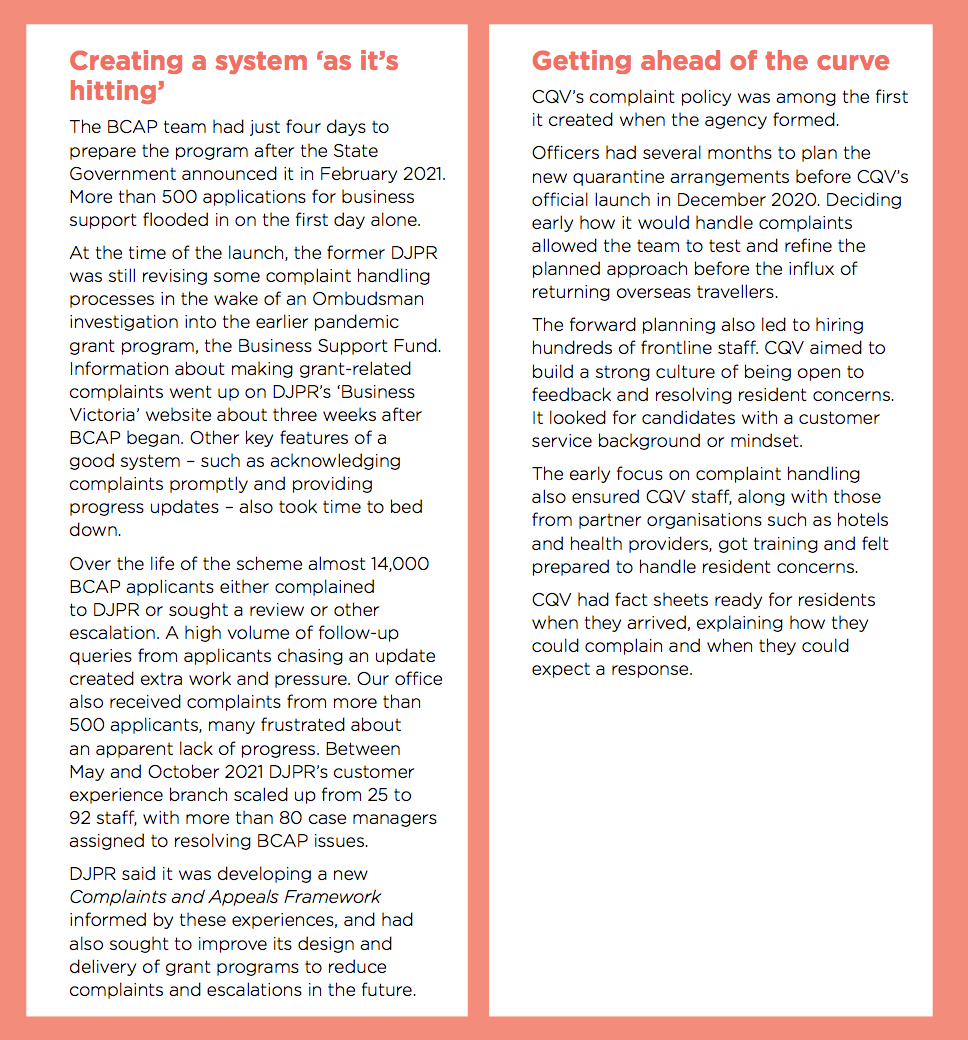
Lesson 2. Lean on Experts
If you are called on to set up a complaint handling system at speed, there will always be people and resources who can help.
Some of the agencies we spoke with adopted or adapted existing complaint policies and procedures. Others turned to specialist complaint handling or review officers in their agency to build and tailor new systems.
You can also speak with other Victorian public sector agencies who have run emergency programs before about their experience and policies. And you can consult with us at the Victorian Ombudsman, as well as using the good practice guides we produce.
The Standards Australia Guidelines for complaint management in organizations (AS 10002:2022) offers another useful source of information to help you step through the elements you will need for a good complaint handling system.

Talk to people who have been there before and use theknowledge to build better processes.
BCAP team

Lesson 3. Prioritise Accessibility
During an emergency you may be dealing with people who do not usually interact with government or your agency and are not aware of how it operates. Even if your process is simple and easily understood, some people will likely need assistance to make a complaint.
As noted in Fault Lines: an independent review into Australia’s response to COVID-19, we should all ‘have societal fault lines front of mind’ in future crises to avoid worsening existing inequalities or disadvantage. Be especially alert to the needs of people who may be vulnerable due to disability, language, location, age, cultural background, financial status or other factors.
Offer flexible methods for making a complaint, such as in person, over the phone, or in writing. Beware the digital divide: not everyone can access online or mobile services, especially during natural disasters.
Remember also that not everyone is comfortable dealing with government. Build relationships with community organisations and representatives who can be a liaison point between your program and its users.

During the scheme we met regularly with external agencies providing support to vulnerable and disadvantaged cohorts to ensure they had all the information they needed …
RTDRS team

Lesson 4. Anticipate Problems.
The more time you invest to identify and address potential problems, the fewer complaints you will get and the easier they will be to manage.
Good customer service is one of the best ways to reduce complaints. Let people know what your service does, what they can expect and when. Keep people informed if things take longer than planned.
Tried and tested technology also avoids problems. If you can adapt systems that have worked before or find time to test new systems before launch, they are more likely to stand up to pressure.
Try to anticipate problems for people using your service and fix them early. Put yourself in the shoes of your users and imagine what might challenge them.
Better still, ask them. By setting up feedback systems with stakeholders and service users – through forums, surveys or other platforms – you can find out what people really think before issues turn into complaints.

It is not about resolving complaints quickly; it is about preventing them in the first place. Think about how to set up the program to minimise the number of complaints.
BCAP team

Lesson 5. Be Ready to Scale Up
Planning a surge workforce is a key lesson from the COVID-19 pandemic. Emergency programs must be staffed quickly. This needs to include people who can deal with complaints.
The agencies we spoke with managed this challenge in different ways, including hiring in some instances hundreds of new frontline workers, contracting out certain functions or redeploying existing staff.
Each of these options can bring its own problems. If you are contracting out functions involving complaint handling, such as using an external call centre, you need to make sure workers can access the information they need to give informed advice to people. If you are hiring new staff, make sure you can provide the technology, training and supports they need to do their job. And if you are taking people from other parts of your agency, think about how to manage the impact on your usual services.
Increasing the size of your workforce, especially in a fast-moving situation, will likely also require new ways of communicating and managing people. You might need more meetings, or to find other ways of getting up-to-date messages out to your people.

It worked well for us to pause some services and use existing staff to help with the new scheme. That might not be right forother situations, it’s all contextual.
RTDRS team

Lesson 6. Hire and Train Carefully
Complaint handling and dispute resolution are specialist skills. Finding large numbers of staff with skills at short notice is unrealistic.
You will need experienced specialists to help set up your complaint handling system. However, for frontline staff, agencies consistently told us they looked for candidates with good people skills such as listening, empathy, patience, and respect.
Once you have a good frontline workforce in place, you can train them in the specifics of your complaint handling system. The agencies we spoke with used different training methods such as in-person induction sessions, video recordings, and written information on internal websites and systems.
Some agencies stressed the need for a dedicated training team, so key staff are not diverted away from the frontline to train new people.
It is also important to empower staff to do their job and resolve problems when they find them. Do not tie staff up by requiring layers of approval to resolve simple problems. Ensure appropriate delegations or authorisations are in place.

Recruit the right people … and give them clear and comprehensive training.
BCAP team

Lesson 7. Be Sensitive to Distress
People seek out emergency response or relief services because they are in trouble. You will be dealing with people who are upset, and perhaps scared. In the worst emergencies, they might have lost everything.
Complaint handling systems must be sensitive to these needs. Expectations of services will be high and tolerance for bureaucracy will be low. You may need to think about shortening your usual response times.
Whatever timeframe for responding to complaints you choose, make sure you can meet it. Tell people what it is, and if you need more time, update them as soon as you can.
While proper process is important to protect the integrity of public funds, you will need to explain why things take longer. The challenge is to be realistic as well as responsive. If you do not meet your promises, and do not explain why, the result will be more complaints.
You will need to think about how you communicate. This is discussed further in Lesson 8. We all find it hard to take in information when we are upset. Your information needs to be clear and tailored to the needs of diverse groups of people. You may need to repeat it.
People also appreciate personal service in these situations. This can be hard to achieve in large-scale programs. But if you have hired staff for their people skills, let them use them.
At times distress may result in people making threats to harm themselves or others, or to commit a crime. Ensure your staff have clear guidance and are well trained on what to do to support complainants while protecting themselves and others. This is discussed further in Lesson 12.

It was a highly emotive environment which led to some difficult conversations. Some ... [unsuccessful applicants] ... were highly upset and, in some instances, inconsolable.
SRO team

Lesson 8. Communicate Early and Often
Communicating clear, consistent and up-to-date information is vital. An open and transparent approach will attract fewer complaints, even if you are telling people something they do not want to hear.
Remember that people do not digest information as easily when they are upset. Give complaint information to users during their first contact with you, and repeat it in further interactions. Detail where, how and when complaints can be made, the handling process and timeframes.
What may seem like a short amount of time to you may seem an eternity to users. Communicating clear and realistic timeframes for your services, and letting people know if you are unable to meet them, will reduce the risk of stressed users clogging your system seeking updates.
It is good practice to inform people as soon as you can of the outcome of their complaint, the reasons, any redress options, any actions you will take as a result, and other avenues they could pursue.
If you receive a high number of complaints about an issue, preparing templated responses can save time and resources. Be aware, though, this approach can trigger more complaints or queries if done badly. Where possible, tailor responses to reflect the individual’s situation and needs.

The more you share about your service, the better things go.
CQV team
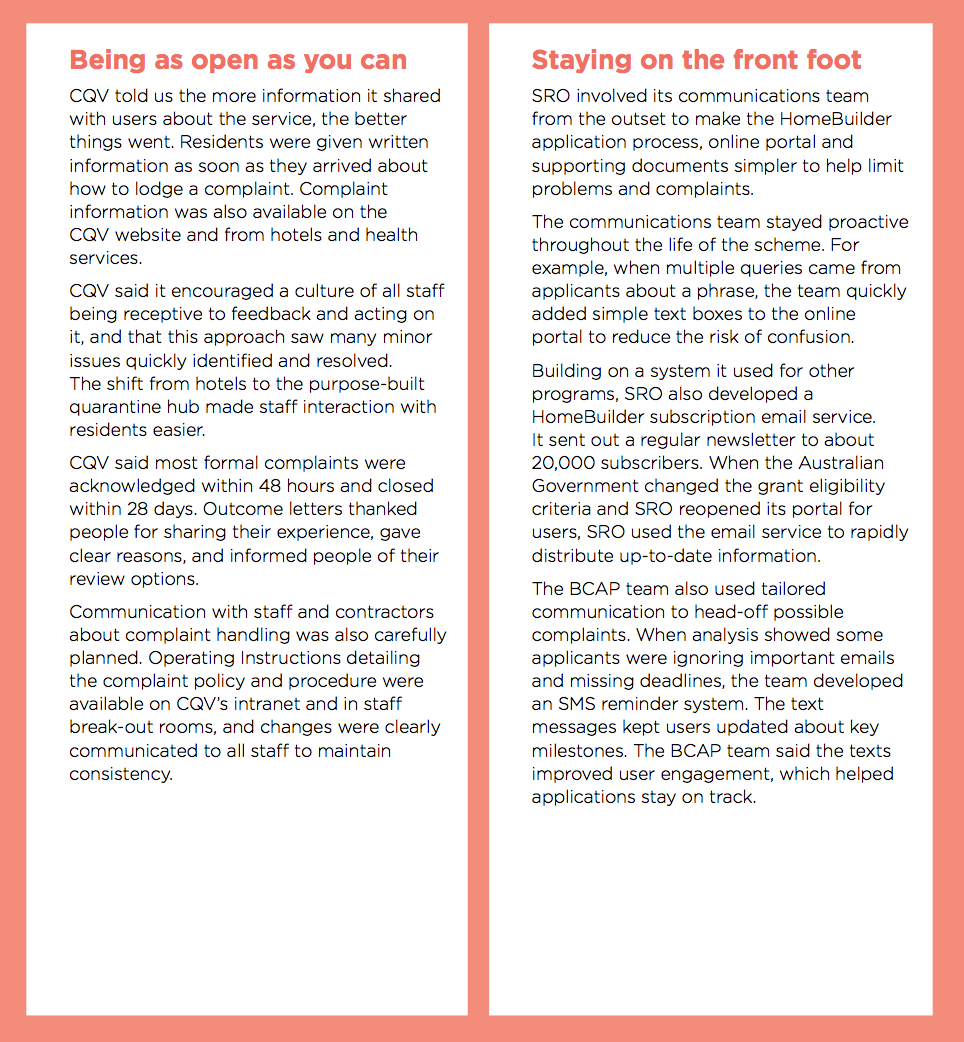
Lesson 9. Be Fair, and Offer Review
Programs and services set up quickly – especially those with little lead time between announcement and launch – will likely need to adapt as circumstances unfold.
Timely and responsive complaint handling will help identify and minimise any pain points or barriers people experience with either your scheme, or your complaint management.
Regardless of how quickly the program is set up, Victoria’s Charter of Human Rights and Responsibilities Act 2006 (Vic) requires public authorities to consider relevant human rights when making decisions.
Remember the people you deal with are likely feeling powerless and under strain. A rigid approach which ignores individual circumstances risks being unfair. Empower all staff to be flexible, take individual circumstances into account and use discretion. For example, give people an opportunity to fix basic mistakes in their application before refusing support.
If program eligibility rules shift, tell people. Clearly spell out changes such as revised dates or extra proof required. If requirements change, think about whether past decisions should be reconsidered under the new criteria.
Some complaints will be complex and require detailed consideration. Others will require escalation if the complainant is not satisfied with the outcome. Build avenues for internal and external review into your system, and clearly explain your process so people know what to expect.

We view complaints as a crucial avenue for ensuring decision-making is fair and reasonable – and for taking corrective action if not.
BCAP team

Lesson 10. Build Strong Relationships
Complaints will not always come directly to your team. People in distress might take their issue elsewhere, such as Ministers, MPs or the Victorian Ombudsman. Try to identify and involve complaint handling stakeholders early. These relationships will be invaluable if problems flare.
If you are delivering a program jointly with another government agency or a private sector partner, a strong working relationship with them is also vital. Be very clear from the start on roles and responsibilities, and how you will share information appropriately.
For joint programs, it is important to decide who will manage the relationship with people who raise complaints. Provide a single point of contact, and a joint response. Put measures in place to track promised actions, and make sure they are completed.
Be ready to cooperate with oversight bodies and deal promptly with their enquiries. Remember, an independent eye and constructive feedback can often help you resolve complaints faster and more effectively.

We gave the Victorian Ombudsman a heads-up when some of our services had to be modified or paused to staff the new scheme, in case they got complaints.
RTDRS team

Lesson 11. Learn and Improve
There is no ‘set and forget’ in a crisis. Your system will not be perfect at first, especially if established in a rush. Even once it is bedded down, there will still always be ways to make it better.
Welcome complaints as a vital tool to help you improve your service. They can shine light on systemic weaknesses and flaws and identify opportunities to strengthen your processes, policies, structure, resourcing or training. They also provide valuable insight into the changing needs and concerns of your users.
Think carefully about what information you will need to collect from the start to enable the analysis and reporting of complaint trends. At a minimum, it is useful to be able to track the number of complaints, common issues raised, outcomes, and required actions.
Monitor how well complaints are being handled and resolved too. Keep a close eye on complainant satisfaction levels and whether timeframes are being met. Spot quality checks by supervisors are a useful way to ensure staff are handling matters consistently. Surveys and social media can also be handy sources of feedback.

Learning from your complaints means understanding that there is room to adapt and change things, not sticking to the processes and frameworks that have been developed previously.
BCAP team

Lesson 12. Look After Your Staff
Depending on the nature of the emergency you are responding to, your complaint handling staff may well face challenges working remotely on top of extra work pressures and distressed complainants.
Maintaining an energised and positive work culture and protecting staff wellbeing is essential.
Be aware of how individual staff are personally affected by the crisis. They might suffer loss or illness. They might have to work remotely or change shifts to juggle carer duties. They might not be able to work at all. Be willing to adjust roles or duties to maintain work-life balance and prevent burnout.
Support all staff to maintain a healthy, positive attitude. Hold regular team meetings with a focus on wellbeing. Set up regular manager check-ins or a buddy program. Provide and promote ready access to an employee assistance program for confidential mental health support.
Given the likelihood of high emotions during a crisis, you must put in place measures to protect your staff from aggression, verbal abuse or threats.
Have a policy and procedure on handling complex behaviour by complainants and offer training too. Consult the Victorian Ombudsman’s good practice guide on managing complex complainant behaviour for more information on this topic.

It’s not just applicants experiencing hardship. Staff members do too.
BCAP team

Putting it all together
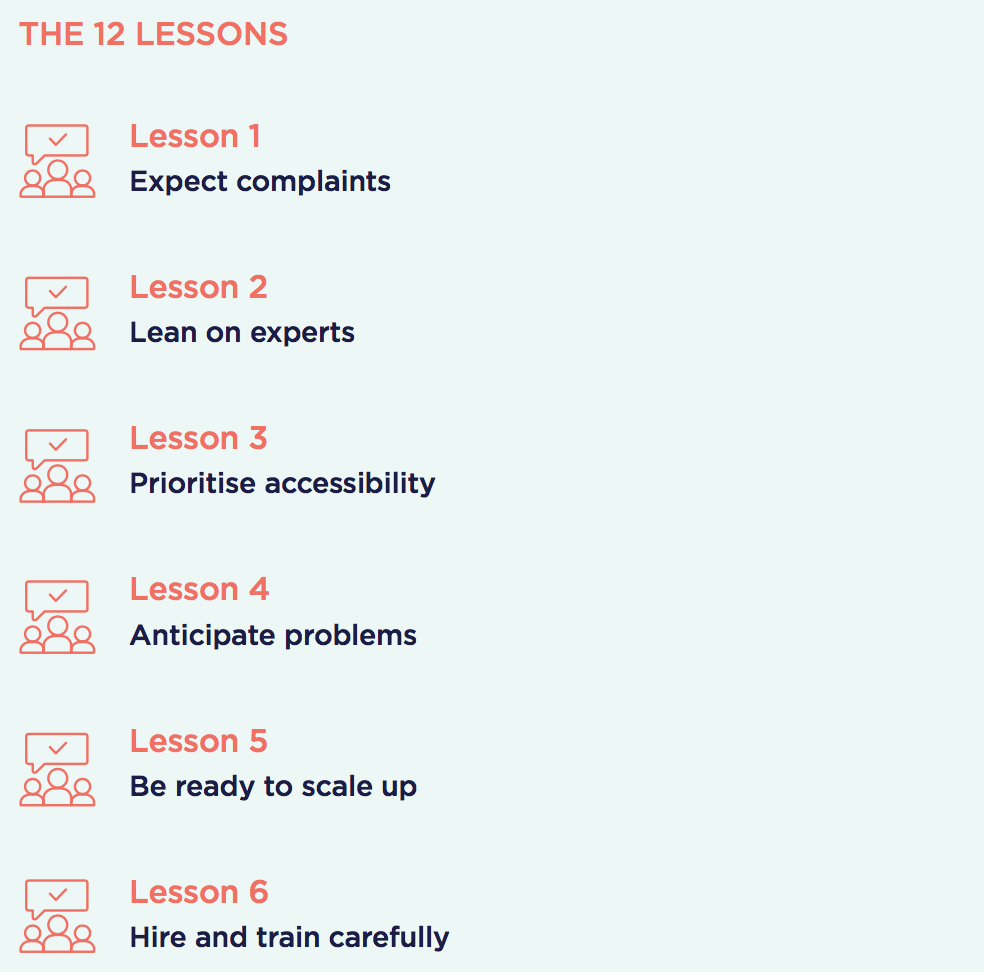
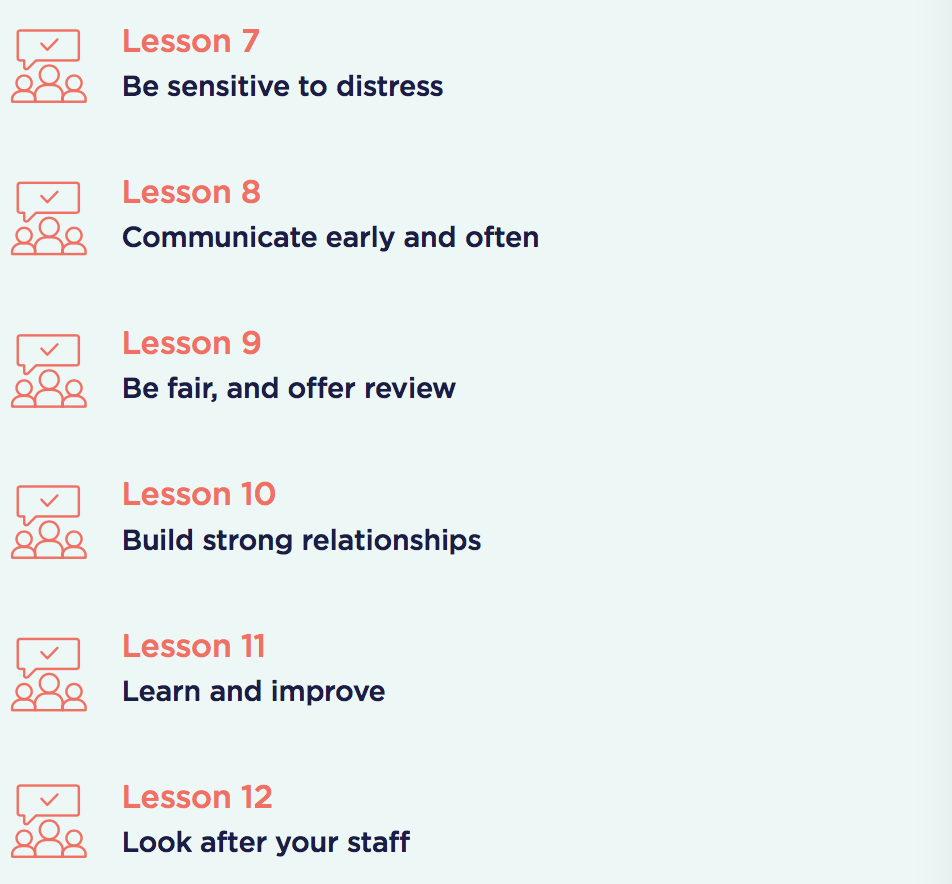
Further information
There are many resources available to assist public sector agencies to handle complaints well. Here are some publications you might find useful:
- Victorian Ombudsman Complaints: Good Practice Guide for Public Sector Agencies
- Commonwealth Ombudsman Better Practice Complaint Handling Guide
- Victorian Ombudsman Good Practice Guide: Managing Complex Complainant Behaviour
- NSW Ombudsman Managing unreasonable conduct by a complainant
- Standards Australia Guidelines for complaint management in organizations (AS 10002:2022)
- Victorian Government Accessibility guidelines for government communications
You can also contact us at the Victorian Ombudsman.
Our office’s portfolio manager for your agency can help if you would like to discuss good complaint handling practices.
You can find more information about Victorian Ombudsman policies and practices on our website at www.ombudsman.vic.gov.au.
